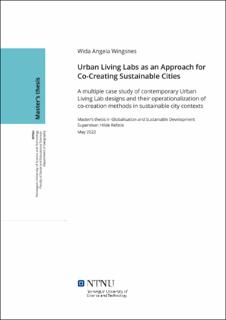| dc.description.abstract | As a response to the growing sustainability issues there are new types of collaborations emerging in the form of Urban Living Labs (ULL). ULLs are increasing in popularity as an approach for tackling sustainability challenges in urban cities. However, the role of ULLs in urban governance is not yet completely clear. This thesis takes form as a multiple case study by analyzing how the ULL approach is articulated, and co-creation operationalized, in contemporary projects and initiatives towards sustainable cities. The three ULL cases analyzed in this thesis are: United Future Lab (Ålesund, Norway), Bøker & Bylab (Trondheim, Norway), and Asprela + Sustentável (Porto, Portugal). Through applying qualitative research methods studying three separate cases, data was collected through nine semi-structured interviews providing the project to point to certain tendencies in the design of the ULL approach. Findings point to the three characteristics geographical embeddedness, experimentation and testing, and participation and user involvement as characteristics identified in the ULL design in the selected cases, in line with academic literature. Furthermore, findings suggest how co-creation is seen as a crucial element as part of the ULL approach in the selected cases, being characterized by partnerships between sectors (public-private-academia-citizens), and collaborations working towards a common goal of tackling sustainability issues. Tendencies suggest that main advantages of co-creation through the ULL approach in the cases was tightly linked to the big knowledge exchange occurring in cross-sectoral communication and citizen involvement, seen to increase the likelihood of producing better solutions for society and the environment. Furthermore, findings suggest a significant overlap in identified benefits and added value of the co-creation concept through the ULL approach, and the added value of the ULL approach in its entirety in the cases when working with sustainable city projects. Main findings in overlapping value are related to the ULL being a “physical neutral arena” for collaboration, facilitating innovation for all groups in society. However, findings do also point to a problematic nature with the cases co-creation process through the ULL approach, mainly identified as communication issues related to different value systems and predetermined habits of each stakeholder. | |
